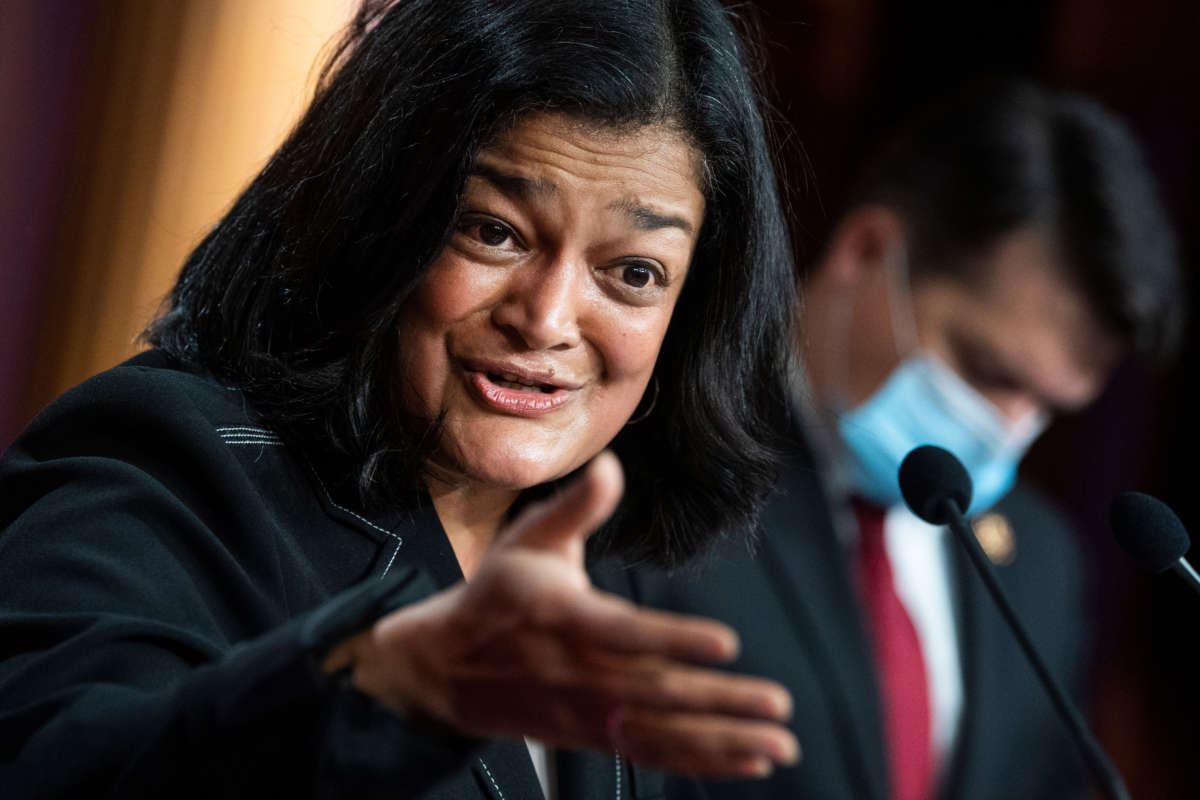Rep. Pramila Jayapal (D-Washington) organized over 80 House Democrats to sign a letter calling on President Joe Biden to expand Medicare in his administration’s upcoming American Families Plan.
The lawmakers are asking Biden to lower the eligibility age for Medicare from 65 to 60 or even 55, require Medicare to negotiate drug prices, and add benefits such as dental, vision and hearing to Medicare coverage. In the letter, the Democrats argue that this would be “a critical investment in health care to bolster the security of our country’s economy and families.”
“As we emerge from the COVID-19 pandemic — the nation’s most acute health care crisis in the last century — now more than ever, we must ensure that families and older adults are equipped with the health coverage they need,” the lawmakers write.
The lawmakers say that expanding coverage by lowering the eligibility age for Medicare is vital to the nation’s health and could provide immediate relief to many Americans. They cite a study by Stanford researchers that found that cancer diagnoses spike up at the age of 65 because many adults are suddenly diagnosed once they have health care coverage under Medicare and are able to seek out care.
Lowering the eligibility age to 60 would provide an additional 23 million people access to health care, the lawmakers write. Lowering it further to 55 would expand coverage to over 40 million people.
The letter writers also cite statistics on Medicare beneficiaries who still struggle with their health because basic versions of Medicare coverage don’t cover vision, hearing or dental. Statistics from 2018 from The Commonwealth Fund cited by the Democrats show that over 70 percent of Medicare beneficiaries struggle to eat or hear, likely due to this gap in coverage, and 43 percent hadn’t had an eye exam in the past year despite having trouble seeing.
The House Democrats who signed the letter are also urging Biden to address prescription drug prices. The U.S. pays the highest prices of any other country for prescription drugs, as Sen. Bernie Sanders (I-Vermont) pointed out last month when he introduced a bill that would, similarly to the House Democrats’ request, also allow the government to negotiate drug prices.
“By prioritizing the inclusion of robust drug-pricing provisions, we can produce enormous federal savings and use it to sustainably expand health coverage, equity, and access,” the lawmakers wrote. They argue that Medicare could save hundreds of billions of dollars by negotiating prices with pharmaceutical companies.
The House Democrats’ letter comes just after Sanders and 16 other Democratic senators also sent a letter to Biden urging him to include similar Medicare expansions. “We have an historic opportunity to make the most significant expansion of Medicare since it was signed into law,” the senators wrote.
The push by members of Congress for Medicare expansion comes as other progressive groups are launching a $6 million campaign “ahead of President Biden’s American Jobs and Families Plan address, doubling down on its commitment to passing a permanent, national paid family and medical leave policy,” according to Politico.
The push is led by Paid Leave for All, a coalition of groups that are committed to getting paid medical and family leave passed in the United States. The U.S. is one of only a small handful of countries that don’t have guaranteed paid parental leave. Biden’s plan will call for paid family leave but reportedly calls for less than half of what other Democrats call for in funding for the policy.
The Biden administration is set to release the $1.8 trillion American Families Plan on Wednesday, which will also contain proposals for making community college free and subsidizing child care costs using funds partially generated through a hike on capital gains taxes for the wealthy.
Join us in defending the truth before it’s too late
The future of independent journalism is uncertain, and the consequences of losing it are too grave to ignore. To ensure Truthout remains safe, strong, and free, we need to raise $22,000 by the end of today. Every dollar raised goes directly toward the costs of producing news you can trust.
Please give what you can — because by supporting us with a tax-deductible donation, you’re not just preserving a source of news, you’re helping to safeguard what’s left of our democracy.
